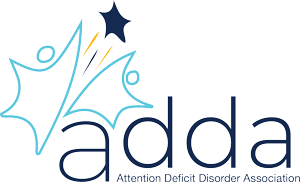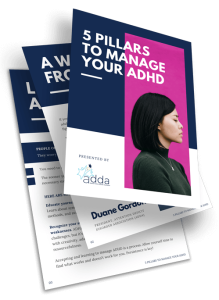
Inside the ADHD Brain: Structure, Function, and Chemistry
It’s not “all in your head.” It’s all in your brain—literally.
If you’ve ever heard that ADHD is a made-up disorder caused by laziness, a lack of willpower, or ineffective parenting, you’re not alone. But this statement couldn’t be further from the truth.
An ADHD brain isn’t wired the same way as a non-ADHD one. Science suggests that specific differences in the brain’s structure, function, and chemistry may be one possible cause of ADHD.
For instance, brain experts have found that various medical conditions are linked to lower levels of chemical messengers in the brain known as neurotransmitters. These disorders include anxiety, depression, Alzheimer’s, mood disorders, and ADHD.[1]; [2]
In other words, your struggles with ADHD are very real. They happen because of how the ADHD brain works.
Continue reading to learn more about how ADHD affects the brain. We’ll also look at the main differences in the structure and function between an ADHD brain and a non-ADHD, neurotypical one.
Differences Between an ADHD Brain and a Non-ADHD Brain
One of the most significant differences between an ADHD brain vs. a normal brain is the level of norepinephrine (a neurotransmitter). Norepinephrine is synthesized from dopamine. Since the two go hand-in-hand, experts believe that lower levels of dopamine and norepinephrine are both linked to ADHD.[3]
An imbalance in the transmission of dopamine in the brain may be associated with symptoms of ADHD, including inattention and impulsivity. This disruption may also interfere with the dopamine reward pathway, changing how the ADHD brain perceives reward and pleasure.[4]
The structure of the ADHD brain can also differ from a non-ADHD brain in certain areas, including the following:
- Frontal cortex: This region regulates your behavior, emotions, and attention.[5]
- Limbic regions: The limbic system influences your emotions and motivation. ADHD-related changes to this area of the brain can contribute to hyperactivity, inattention, and poorer decision-making.[6]
- Basal ganglia: The basal ganglia is responsible for motor learning (picking up a particular skill through practice or experience). It also helps regulate your behavior, emotions, and ability to plan, focus, and multi-task—all of which are affected by ADHD.[7]
Another significant difference involves the default mode network (DMN) of the brain. The DMN activates when you’re daydreaming or not focused (or unable to focus) on a task or activity.
In ADHD, the DMN is more often activated. As a result, you may feel that your focus is constantly being pulled away from the task at hand toward unrelated thoughts.[8]
And that explains why staying focused on tedious or repetitive tasks can be such a chore with ADHD.
ADHD Brain: Structure and Function
An ADHD brain differs from a neurotypical one in many ways—from the size and activity levels of certain regions to the chemical signals traveling throughout the brain.
Because of these differences, you may find it challenging to organize, plan, focus, and manage your emotions with ADHD.
Let’s dive deeper into what the structure, network, and chemistry of an ADHD brain look like.
ADHD and the Brain’s Frontal Lobe
Your brain is divided into different sections known as lobes, one of which is the frontal lobe. It controls key functions related to:
- Planning and organization
- Focus and attention
- Self-monitoring and self-control
- Memory
- Communication
- Problem-solving
- Impulse control
- Language
- Social behavior
- Motivation
- Judgment
The frontal lobe is the largest part of the brain affected by ADHD. This part of the brain may mature at a slower pace or show disrupted activity and connectivity in people with ADHD.[5]
That’s why staying focused, planning, and controlling impulses can be challenging for ADHDers.
ADHD Brain Networks
Groups of nerve cells called neurons form networks in your brain. These networks are responsible for relaying signals throughout the brain via chemical messengers.
In an ADHD brain, imbalances in the function and structure of these networks may cause the brain to transmit messages less effectively.
Research has found deficits in the neural networks linked to attention and executive function in children and adults with ADHD. This may affect your ability to organize, prioritize, plan, focus, remember instructions, and work toward your goals.[9]
In addition, ADHD may alter the network connections between your prefrontal cortex (a section of the frontal lobe) and other areas of the brain. Scientists believe this is associated with poor planning, distractability, impulsivity, and forgetfulness in ADHD.[9]
Other deficits in networks of the frontal and parietal lobes of the brain can affect your attention, motivation, and ability to control your responses and predict the difficulty of a task. It may also change how you make decisions based on the perceived rewards.[9]
Brain Chemistry and Neurotransmitters in ADHD
Neurotransmitters are chemical messengers that transmit signals from nerve cells to other target cells in your body. These chemical signals pass from one nerve cell to the next throughout the brain and body.
As noted earlier, dopamine and norepinephrine are two neurotransmitters that might be associated with ADHD.
Noradrenaline plays an important role in the prefrontal cortex, and ADHD may disrupt its transmission in the brain.
This could make it more difficult to retain the information needed to complete tasks successfully. It may also impair your inhibitory control, which is how well you can suppress distractions, urges, or behaviors that interfere with your goals.[3]
Meanwhile, dopamine helps us regulate our emotions and is linked to feelings of pleasure and reward.
In ADHD, there might be lower levels of dopamine in the brain. This makes it harder to maintain motivation, especially when the rewards seem small or not immediate. ADHD brains tend to favor short-term, smaller rewards over long-term, more significant ones.[4]
The ADHD Brain Is Wired Differently
Scientists have found unique differences in the structure, chemistry, and networks of the ADHD brain. These differences can explain many of the symptoms and challenges ADHDers experience.
If you think you may have ADHD, you can take ADDA’s ADHD test for adults. This questionnaire helps you understand whether your symptoms suggest ADHD so that you can take the next step toward diagnosis and support.
ADHD is as real as it gets. Because of this, getting proper treatment and support is essential and, often, life-changing.
While your struggles with ADHD are valid, they don’t have to keep you from reaching your full potential.
By collaborating with your healthcare team, you can find an effective treatment plan and helpful strategies to manage your symptoms—empowering you to work toward your goals and ambitions without ADHD holding you back!
Lean on your community. Get a deeper understanding of your ADHD. Collective wisdom is empowering. In ADDA+, you’ll navigate your journey with confidence and resilience.
References
[1] Liu, Y., Zhao, J., & Guo, W. (2018). Emotional Roles of Mono-Aminergic Neurotransmitters in Major Depressive Disorder and Anxiety Disorders. Frontiers in Psychology, 9. https://doi.org/10.3389/fpsyg.2018.02201
[2] Ulke, C., Rullmann, M., Huang, J., Luthardt, J., Becker, G. A., Patt, M., Meyer, P. M., Tiepolt, S., Hesse, S., Sabri, O., & Strauß, M. (2019). Adult attention-deficit/hyperactivity disorder is associated with reduced norepinephrine transporter availability in right attention networks: a (S, S)-O-[11C]methylreboxetine positron emission tomography study. Translational psychiatry, 9(1), 301. https://doi.org/10.1038/s41398-019-0619-y
[3] del Campo, N., Chamberlain, S. R., Sahakian, B. J., & Robbins, T. W. (2011). The Roles of Dopamine and Noradrenaline in the Pathophysiology and Treatment of Attention-Deficit/Hyperactivity Disorder. Biological Psychiatry, 69(12), e145–e157. https://doi.org/10.1016/j.biopsych.2011.02.036
[4] Volkow, N. D., Wang, G. J., Kollins, S. H., Wigal, T. L., Newcorn, J. H., Telang, F., Fowler, J. S., Zhu, W., Logan, J., Ma, Y., Pradhan, K., Wong, C., & Swanson, J. M. (2009). Evaluating dopamine reward pathway in ADHD: clinical implications. JAMA, 302(10), 1084–1091. https://doi.org/10.1001/jama.2009.1308
[5] Gehricke, J. G., Kruggel, F., Thampipop, T., Alejo, S. D., Tatos, E., Fallon, J., & Muftuler, L. T. (2017). The brain anatomy of attention-deficit/hyperactivity disorder in young adults – a magnetic resonance imaging study. PloS one, 12(4), e0175433. https://doi.org/10.1371/journal.pone.0175433
[6] Plessen, K. J., Bansal, R., Zhu, H., Whiteman, R., Amat, J., Quackenbush, G. A., Martin, L., Durkin, K., Blair, C., Royal, J., Hugdahl, K., & Peterson, B. S. (2006). Hippocampus and amygdala morphology in attention-deficit/hyperactivity disorder. Archives of general psychiatry, 63(7), 795–807. https://doi.org/10.1001/archpsyc.63.7.795
[7] Lanciego, J. L., Luquin, N., & Obeso, J. A. (2012). Functional neuroanatomy of the basal ganglia. Cold Spring Harbor perspectives in medicine, 2(12), a009621. https://doi.org/10.1101/cshperspect.a009621
[8] Rubia K. (2018). Cognitive Neuroscience of Attention Deficit Hyperactivity Disorder (ADHD) and Its Clinical Translation. Frontiers in human neuroscience, 12, 100. https://doi.org/10.3389/fnhum.2018.00100
[9] De La Fuente, A., Xia, S., Branch, C., & Li, X. (2013). A review of attention-deficit/hyperactivity disorder from the perspective of brain networks. Frontiers in Human Neuroscience, 7. https://doi.org/10.3389/fnhum.2013.00192






7 Comments
If a lack of dopamine is the cause/reason for ADHD/ADD, then why r we not given dopamine?
Why drugs that dont work. Try to tell a dr u need a refill on your medication & be told adults dont have ADD! And this was a dr who practices ADHD. Life has been terribly hard for my daughter & myself. Just trying to get thru 13 yrs of schooling that everyone understands but me, was horribly embarrassing. Also having a parent who tells u u will be digging ditches the rest of your life because school & making friends were just not who i am. Also being adopted @ 7 by a mentally ill woman who did some very bad damage is also hard to separate the constant abuse from ADD. I say ADD because i came up w/the $5K to get tested.I Wanted to know if the constant abuse had done brain damage or was life under an army captain,, bipolar pediatric RN who didnt want the 3 siblings that came w/our youngest sister. Yes she agreed to taking the 4 of us & proceeded to knock the daylight out of us. Its a wonder she didnt kill us. Im the only one out of 8 sibling who doesnt drink nor ever smoked. Im still here trying to live w/ADHD. I have messes where ever i go n this house. Anyone can tell where i sit during the day & where i sleep. I dont have a community of help nor friends. Ive been to hell & back & cannot control all the info i give out. But because i give out my life im very particular w/ppl who lie! I had no idea that ppl w/ADHD talked too much, shared too much. Its taken me 50yrs to b able to speak to groups of ppl. Now i cant stop talking. I grew up hearing children r to b seen & not heard. I was also told by the father figure “frankly lucy no one wanted u, u r too old, ppl want babies”. whats a brain dead 6 yr old supposed to do w/that kind of info. I prayed every night that God would rescue us from the big bad Army Captain. Luckily age 18 comes n the winter for me so i left just a cpl days from graduating & took the sister whom was trying to call the police while it was being yanked out of the wall & thrown across the room. Much better leaving w/nothing than spending another night w/the 2 of them. Dopamine,
Epinephrine what r we waiting for if science already knows? Oh & i have Alzheimers to look forward to. My bio dad APOE4/4. I already know my adult children have my 4. C what i mean? Over sharing!
This is informative, however I think you should replace the word “normal” with “neuro-typical” if you want to present yourself as a reputable source of information.
i agree
Yes I agree
how can I get my 26 yr old grandsons with untreated add to see someone about meds & therapy
The information provided was informative and clearly understandable. I am fifty-three years old I have lived with ADHD undiagnosed. My life has been a nightmare. I am hoping to find the tookz needed to take control of my life now that I know what the problem is.
Thank you for not only educating people about adhd, but doing it in such a kind & professional manner. This information is worded correctly & not based on people’s annoyances or opinions. Just facts. Thank you for spreading the truth & helping me understand my brain!!